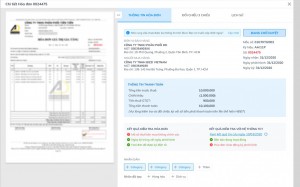According to VnEconomy newspaper, by the end of August 2023, the tax agency had received and processed up to 4.9 billion electronic invoices. Of these, there are more than 1.5 billion electronic invoices issued with codes and more than 3.5 billion electronic invoices without codes. This is an impressive number, demonstrating the tax industry's continuous efforts in implementing electronic invoices recently.
However, currently there are still many problems related to electronic invoice issuance that businesses are facing.
Let's Bizzi Find out!
Problems of businesses when issuing electronic invoices
There are many difficulties in applying electronic invoices that businesses are facing. Although the tax industry has released detailed guidance documents for each specific situation, in practice, many businesses have expressed that they need a more general guidance applicable to all cases.
At the online dialogue conference with the topic "HCMC Tax Department. Hanoi promotes digital transformation, guides, supports, and accompanies businesses and taxpayers to develop production and business activities", many problems when issuing electronic invoices are reported by businesses.

- Ask: Regarding the time of invoice issuance for sales on e-commerce platforms, when the order is notified of successful delivery, or when money is returned to the account, or the goods are shipped, must an invoice be issued?
- Answer: In case an enterprise sells goods on an e-commerce platform, the time of invoicing shall comply with the provisions of Clause 1, Article 9 of Decree 123/2020/ND-CP. Accordingly, the time of invoice for the sale of goods is the time of transfer of ownership or rights to use the goods to the buyer, regardless of whether money has been collected or not.
This issue is also attracting the attention of many businesses, especially in the context that many e-commerce platforms only consider an order successful after a period of time, usually 7 days after the product is shipped. delivered and the customer has no complaints or requests for returns. Therefore, many opinions believe that it is unrealistic for tax authorities to require businesses to issue invoices as soon as the product is delivered, especially when information from the delivery party may be updated slowly.
Regarding invoicing in the case of securities companies, there are some peculiarities that need to be considered. Specifically, many securities companies have customers who are retail buyers and do not require invoices. Therefore, some of them believe that the company needs time to synthesize revenue information and related data to invoice with accurate service value.
Regarding the time of invoice issuance, according to instructions from the City Tax Department. Hanoi, for service providing companies, the time to issue an invoice for service provision is when the service provision is completed, regardless of whether payment has been collected or not. In case the company provides securities services and collects money before or while providing the service, the time of invoice is when the money is collected, according to the provisions of Article 9 of Decree No. 123/2020/ND -CP.
In cases where a securities company provides services to non-business individuals (or business individuals) without the need to receive invoices, they shall issue invoices according to the provisions of Point l, Clause 4, Article 4. 9 of Decree No. 123/2020/ND-CP. When selling securities, the company issues an invoice with the selling price target excluding value added tax.
- Ask: When processing invoices when the buyer returns part of the goods, does the company issue a reduced invoice or does the customer issue an invoice to return to the company?
- Answer: In case the buyer purchases goods from the supplier (seller), the seller has issued an invoice, the buyer has received the goods, but later the buyer discovers that the goods are not in accordance with the specifications and quality and must return the goods. goods, the seller shall issue an invoice to return the goods according to the provisions of Clause 1, Article 4 of Decree 123/2020/ND-CP. Accordingly, the seller and buyer have an agreement clearly stating the return of goods. Based on the goods return invoice, the seller and buyer shall declare in the tax period in which the goods return invoice arises.
Besides the difficulties related to electronic invoicing, there are many other problems that businesses have presented to the city tax authority, including handling when suppliers do not provide invoices or when Buyer does not request invoice.
Although the tax industry has provided guidance documents for each specific case, in the opinion of many businesses, there is a need for an overview guide that applies to all different cases. This can help resolve common problems and ensure consistency in implementing electronic invoices for businesses.
>> See more: Cracking down on invoice violations, tax authorities causing difficulties? – 2023
The Ministry of Finance plans to amend and supplement electronic invoices
According to statistics from the Ministry of Finance, by the end of June 30, 2022, 100% enterprises and organizations (851,372 units) and 100% business households and individuals (65,576 business households and individuals) according to the declaration method. in 63 provinces and cities have converted to using electronic invoices according to Decree No. 123/2020/ND-CP.

In addition to the positive results achieved in implementing Decree No. 123/2020/ND-CP on electronic invoices, the Ministry of Finance has also recognized six groups of problems that need to be supplemented and amended.
Accordingly, the Ministry of Finance plans to amend and supplement regulations on electronic invoices to improve transparency and create favorable conditions for taxpayers as well as organizations in using invoices, receipts, and electronic documents.
Because as noted, in Article 9, the regulations on the time of invoice issuance do not clearly stipulate the time of invoice issuance for goods and services provided to foreign organizations and individuals; Regulations on making invoices after cross-checking between parties do not have instructions for regular, large-quantity supply of goods, activities that also require cross-checking such as securities and insurance.
Article 4 regulates the principles of creating, managing and using invoices and documents, but does not clearly stipulate the preparation of invoices in cases where the buyer returns the goods or the seller terminates or cancels the provision of services; There are no regulations on the lucky invoice program.
In addition, the Ministry of Finance will supplement regulations related to solutions to prevent and limit fraud when businesses register to use electronic invoices and during the process of using electronic invoices, regulations on responsibilities. of organizations providing electronic invoice services; amend and supplement regulations on searching, providing and using electronic invoice information; Amend and supplement regulations related to the responsibilities of parties in the management and use of invoices.
Currently, the Ministry of Finance is collecting comments on the draft Decree amending and supplementing a number of articles of Decree No. 123/2020/ND-CP dated October 19, 2020 regulating invoices and documents.
Introducing the solution of automatically processing input invoices and automatic smart 3-way comparison
Currently, many businesses have converted from using paper invoices to electronic invoices, following the regulations of Decree 123/2020/ND-CP and Circular 78/2021/TT-BTC. Recognizing the necessity of accounting work in daily processing, Bizzi has developed a solution to automate information related to input invoices and perform intelligent 3-way reconciliation. This solution is equipped with many features and utilities to help solve problems related to electronic invoice management effectively.

Automatically process input invoices
- Receive invoices from NCC and automatically analyze and process invoices to ensure accuracy and validity.
- Supports automatic approval and warning of incorrect invoices to NCC when there are invalid invoices via email.
- Check invoice information and seller activity status to ensure the validity and legality of the invoice.
- Synchronize invoices with the system of the General Department of Taxation and third party invoice issuers such as Electricity, Water, Transportation,...
- Automatically extract invoice data according to standard Excel file formats for each type of accounting software.
- All invoices are stored and managed centrally on a system that supports easy searching.
Automatic intelligent 3-dimensional comparison
- Smart 3-way comparison between invoices - orders - warehouse receipts with more accuracy than 99%.
- Handle all reconciliation cases on the system: 1PO – 1INV – 1GR; 1PO – nINV – nGR; nPO – 1INV – nGR; nPO – nINV – nGR
- Detect deviations quickly and improve data accuracy.
- Automatically confirm 3-way comparison of each product line accurately and push information through the customer's ERP system.
- Automatically get PO number from invoice/email from supplier/invoice file.
- Support creating invoices and comparing goods for farmers from templates.
- Automatically convert units of goods and manage goods intelligently.
Above is information related to the Ministry of Finance's plans to amend and supplement a number of electronic invoice regulations along with problems when issuing electronic invoices for businesses. Hope the above information will be helpful to you. Bizzi hopes that accountants in businesses will be provided with full information about the latest regulations from the Government and the Ministry of Finance to help them avoid difficulties during their work. .
Follow Bizzi to quickly receive the latest information:
- Facebook: https://www.facebook.com/bizzivietnam
- Linkedin: https://www.linkedin.com/company/bizzi-vietnam/
- Youtube: https://www.youtube.com/@bizzivietnam


